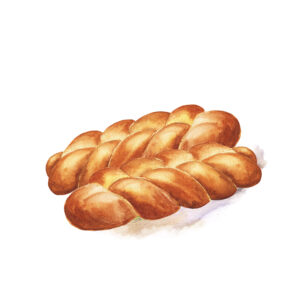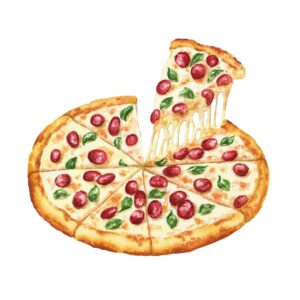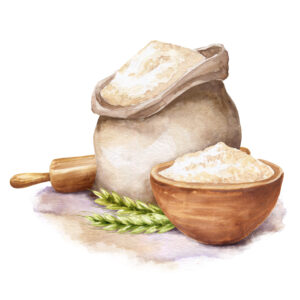Rising Higher
The Journey of Mrs. Suri Jaroslawitz

Rayle Rubenstein
I recently attended a hafrashas challah gathering led by Mrs. Suri Jaroslawitz at the home of a friend. It was a busy Friday morning, and I spent my ten-minute journey there wondering how I’d manage to finish everything in time for the early zman with this addition to my very full schedule. If it really takes a long time, I thought to myself, I’ll just have to leave early.
About 30 seconds into Mrs. Jaroslawitz’s talk, I stopped looking at my watch. About five minutes in, I decided that it was okay if I didn’t manage to finish everything on my list that day.
It wasn’t just her incredible stories of yeshuos that were seen at gatherings such as these – “It’s not a segulah (salvation),” Mrs. Jaroslawitz was careful to explain. “It’s a peulah (work).” Nor was it her blend of excited humor, and inspiration. There was something there in that room that I couldn’t put my finger on.
She told us about the couple who had their first child after more than a decade. She told us about the one who got engaged after a challah group davened for a different person with the exact same name. Then she mentioned, almost in passing, that she had been a school principal before resigning that job to work in her husband’s pizza shop – in her words, as a “pizza lady.”
There it was. That’s what had intrigued me. Because even before she shared those words, I’d sensed a story there behind her dynamic presentation.
Mrs. Jaroslawitz has her hands full – literally – as she runs challah groups almost every day in communities throughout the Tristate area and beyond. She inspires groups of women who gather to perform the mitzvah of challah with explanation and stories of yeshuos.
Indeed, there are many incredible stories of yeshuos that have followed these gatherings, but it was Mrs. Jaroslawitz’s’ personal story that intrigued me most. These are her words, shared with me when I followed up a few days after our first encounter.

From Principal to “Pizza Lady”
I started teaching when I was very young. I’m a chassidishe girl from a chassidish school, and when I graduated I was 16 and three months. Two months later, I walked into my first classroom to teach. I had two teaching jobs, one in the morning and one in the afternoon. I was very happy and excited with my position.
I taught for many years and became an established teacher. I was very comfortable in my classroom, and I wasn’t afraid to do things that other teachers wouldn’t necessarily do. I kept a little bird in my classroom in a cage, and whoever was the best in my classroom could take it home for Shabbos. My students and I really had fun.
One day I got a call from the principal. The assistant principal got very sick, and the school wanted to know if I’d be willing take over her position for grades one through four. I said yes.
The year I became principal I felt like I had reached a certain peak. I was training the teachers – we had very young teachers – and it was so rewarding to share my knowledge and help shape them as teachers. It was the best feeling, and I felt like I had found my place.
Baruch Hashem, the assistant principal recovered and I was offered a position to stay on for the other grades,
But Hashem had other plans for me.
My husband had bought a business – a pizza shop – and he said to me, “I need your help.” So I gave up the offer, and went to work behind the counter at the pizza shop.
For me, it wasn’t a choice. My job had been a part of me. I loved it, the kids loved it, and everyone was happy, but it didn’t matter. When my husband said, “I need you there,” there was not a question in my mind – on any level – where I belonged. A teacher is replaceable; a wife is not. I knew my place, and my place was my home. Always was, always will be. For me, it’s family first, one hundred percent.
My job in the pizza store was to do everything from paperwork to serving customers. There were many humbling moments: being closed by the health department, irate customers, uncooperative employees, and all sorts of challenges that go into a day of hard work. I feel that Hashem put me in that position so that one day, when I’d back go out into the world, it would be with humility – because I have seen both sides of the counter.
Facing Challenges
Changing my career was far from my first time dealing with a challenge. I was 18 and three months when I was married and had a baby right away after a difficult pregnancy. During the years that followed, I was tested with secondary infertility and loss. Today I have a family, Baruch Hashem. Every one of my children is a miracle, and I can’t thank Hashem enough.
There was a point during my years of struggle to build a family, after a lot of hishtadlus (effort), when I felt that I did everything that was available to me to try. What more could Hashem want? Tefillah. That was all that was left. I read in Pirkei Avos, “Asei ritzoncha kirtzono (make your will like His will)” and I realized that maybe I had to surrender to Hashem’s will on His terms. At the same time, I felt that if I was craving life so strongly, the need for my tefillah was there.
I come from a generation where being connected spiritually was in our mothers’ milk. We lived it. We didn’t need to hear shiurim to become spiritual. We were spiritual.
My father was a Holocaust survivor; he was seven after the war. I used to ask him, “How did you stay so whole? How were you able to function?” What he answered me was probably the sharpest thing I ever heard from him. He said, “Suri, where are your eyes?” I answered, “What do you mean? They’re in the front of my face.” He said to me, “Do you know why you don’t have eyes in the back? Because you don’t look back. Your opportunities are ahead of you – not behind you.” That’s how I grew up.
My mother was an only daughter. She had an only brother four years younger. My mother got unconditional love and acceptance from my grandmother. She has such a positive attitude about everything, such deep emunah and simchas hachayim.
That’s what I come from. It’s built in. When you’re born into a house where people have such faith, the resilience is already there. The foundation of values and belief that I was raised with have always guided me.
 Coaching the World
Coaching the World
At one point during my three decades at the pizza store, I felt that I needed to stimulate my mind, so I decided to go for life coaching courses. I was raising kids, marrying off kids, and doing a million other things. I took the little time I had like on a Sunday morning or in middle of the night to log into my courses.
I loved those courses. I began to understand that the human experience it not about what you do; it’s about who you are. You can impact people no matter what position you hold, whether you are a shoemaker or a president.
I never wanted to become a life coach. I’m a very emotional person and I worried that if I ever got involved in a case, I’d become too emotionally involved. But today, I feel like I coach all the people who call me for the challah classes. I use every life coaching skill that I have. These skills have become so intrinsically part of me that I don’t even realize that I’m using them.
People call me for a class and they get chizuk (support), but I’m being mechazek myself. When you give chizuk to others, you’re not a fountain; you’re more like a well that keeps replenishing. When you share your light it spreads but it doesn’t diminish.
Challah Groups
I took challah almost every single day for 30 years in the pizza store. It was done with a lot of mesiras nefesh, and when you plant a seed of sacrifice, sometimes you can watch it grow into something special. That’s how I feel the challah bakes became such a big part of my life.
About 11 years ago, a lady came into my store two days before Yom Kippur and said, “I’m hosting a challah meeting, and I need 40 ladies. Can you please come?”
I told her I had challah meetings all day in the back of my store with my mixer; what did I need another one for?
She said, “My daughter didn’t have children for years. I went around the world for a yeshuah. A Rebbetzin told me to make a hafrashas challah gathering, and my daughter had a baby within 10 months. I’m making one tomorrow. Just come.”
I went. There were 40 ladies around the table, all very serious and intense. We started making the brachah, and someone gave me the names of a couple who didn’t have children for many years and told me to have them in mind. In middle of making the brachah I remembered my niece who was in shidduchim for a long time and had her in mind, too. When I reached the last word of the brachah my son – who was barely 18 years old – came to mind. I thought, Hashem we’re going to be in shidduchim for him soon and it’s not an easy process. Hashem, You be the shadchan. I didn’t say anything to anyone, but the thought came to me and so did the prayer.
I came home with that dough, started braiding, and figured why not call a shadchan about my niece. During the course of the conversation, my son came up. It was Erev Yom Kippur. One week later, on Chol Hamoed Sukkos, my son got engaged.
My husband called my married daughter and said, “Mommy’s going to start making challah bakes now.”
I’ve been running hafrashas challah groups for 11 years now. The reason it got so popular is because people have seen unbelievable yeshuos from it. People take their challah and they daven, and it brings about unbelievable things. It’s not a segulah. It’s that people are taking advantage of an eis ratzon (an auspicious time).
There’s a couple who had their first children, a pair of twins, after 19 years of marriage. A 51-year-old divorced kohen got engaged a month after a challah bake held in his merit to a woman who decided to bake challah at the same time. These are not my stories; they’re the peoples’ stories.
The Dream
The words “Zu hi mitzvas hachallah (this is the mitzvah of challah)” has the same gematria (numerical equivalent) as taryag (613). The Rambam says it’s the equivalent of all 613 mitzvos, so when a woman makes the bracha on challah she gets taryag mitzvos.
Challah is one of the three mitzvos that we women have. These mitzvos are the master key to Heaven. Put your heart and soul into your challah and watch the magic unfold. Pray your heart out when the mixer is on the table, and you will see yeshuos.
I have a goal. 30 years ago, if you told me that the whole Sefer Tehillim could be finished in 10 minutes, I would not have believed you. Today, there are tehillim groups all over the place. Everyone takes a booklet, and in 10 minutes, it’s done.
I would like challah groups to become the new norm. There’s tremendous koach in a group that performs this mitzvah. You get a group together, take challah with a brachah, say Amen, say Mizmor L’Sodah and Nishmas, go home and watch what happens. It’s miraculous!
I have witnessed miracles in my own life and so many others’. Everything is in Hashem’s hands, no matter how much hishtadlus we put in. Sometimes, he just wants our prayers. Sometimes, He sends exactly what we wanted. We don’t know the outcome, but we need to make the connection.
I’m grateful for so many things in my life. Being able to build upon the things I’ve learned and teaching others to channel the koach of prayer while they do the mitzvah of challah might just be the most rewarding part of my journey yet.
You must be logged in to post a comment.